Putting alcohol and sleep medications together isn’t just a bad idea-it’s a medical emergency waiting to happen. You might think having a glass of wine to help you unwind before taking your prescription sleep aid is harmless, maybe even helpful. But the truth is, this combination doesn’t just add up-it multiplies. And the results can be deadly.
Why This Mix Is So Dangerous
Both alcohol and sleep medications work by slowing down your central nervous system. They do this by boosting the effect of a brain chemical called GABA, which tells your body to relax. When you take them together, they don’t just work side by side-they team up. The result? Your brain shuts down faster and harder than either substance could on its own.The U.S. Food and Drug Administration (FDA) says there’s no safe amount of alcohol when you’re using prescription sleep aids. Even one drink-less than what’s in a standard beer-can turn a normal dose of zolpidem (Ambien) into a dangerous overdose. Clinical studies show that alcohol can stretch the half-life of Ambien from 2.5 hours to over 6 hours. That means you’re sedated for much longer than you expect, and your body can’t clear it properly.
What happens when your breathing slows too much? Oxygen levels drop. Heart rate drops. You might not wake up if your body stops breathing. Emergency room data from 2021 to 2022 shows a 27% increase in hospital visits linked to mixing alcohol and sleep meds. The worst cases? People found unconscious, needing intubation, or worse-dead.
Which Sleep Medications Are Most Dangerous?
Not all sleep aids are created equal when it comes to alcohol interactions. The biggest risks come from three types:- Z-drugs (like Ambien, Lunesta, and Sonata): These are the most dangerous. Ambien alone can cause sleepwalking or sleep-driving. Add alcohol, and those behaviors jump from 0.15% to 2.4% of users. One study found that combining Ambien with just 0.08% blood alcohol (the legal driving limit) made people 2.7 times more impaired than alcohol alone.
- Benzodiazepines (like Ativan, Klonopin, Restoril): These are older sedatives still prescribed for sleep. They’re less risky than Z-drugs but still dangerous. A single drink can double your risk of falling or crashing a car.
- OTC sleep aids (like ZzzQuil and Unisom): These contain antihistamines like diphenhydramine or doxylamine. They’re sold as “natural” or “non-addictive,” but they’re just as risky. In adults over 65, mixing these with alcohol increases fall risk by 300%. Hip fractures from these combinations have jumped from 12.7 to 51.3 cases per 100,000 older adults each year.
Meanwhile, melatonin supplements-often seen as a safer alternative-don’t cause the same life-threatening interactions. But they still make you groggy the next day. One study found combining melatonin with alcohol increases next-day drowsiness by 35%.
Real Stories, Real Consequences
People don’t realize how quickly things go wrong. On Reddit, hundreds of users have shared terrifying stories. One person, u/SleepWalker99, described waking up two miles from home with no memory of driving there-after taking half an Ambien and two glasses of wine. That’s not a rare case. Clinical trials show that 2.4% of people on Z-drugs with alcohol experience complex sleep behaviors like sleep-driving. That’s 16 times higher than with the medication alone.On Drugs.com, Ambien has a 1.8 out of 5 safety rating when mixed with alcohol. The most common complaint? “Extreme drowsiness lasting 12+ hours.” Lunesta users report confusion and memory loss. And for older adults, the results are even worse. In AARP forums, 73% of posts from people over 65 describe severe disorientation, hospitalization, or delirium after mixing even a sip of alcohol with OTC sleep aids.
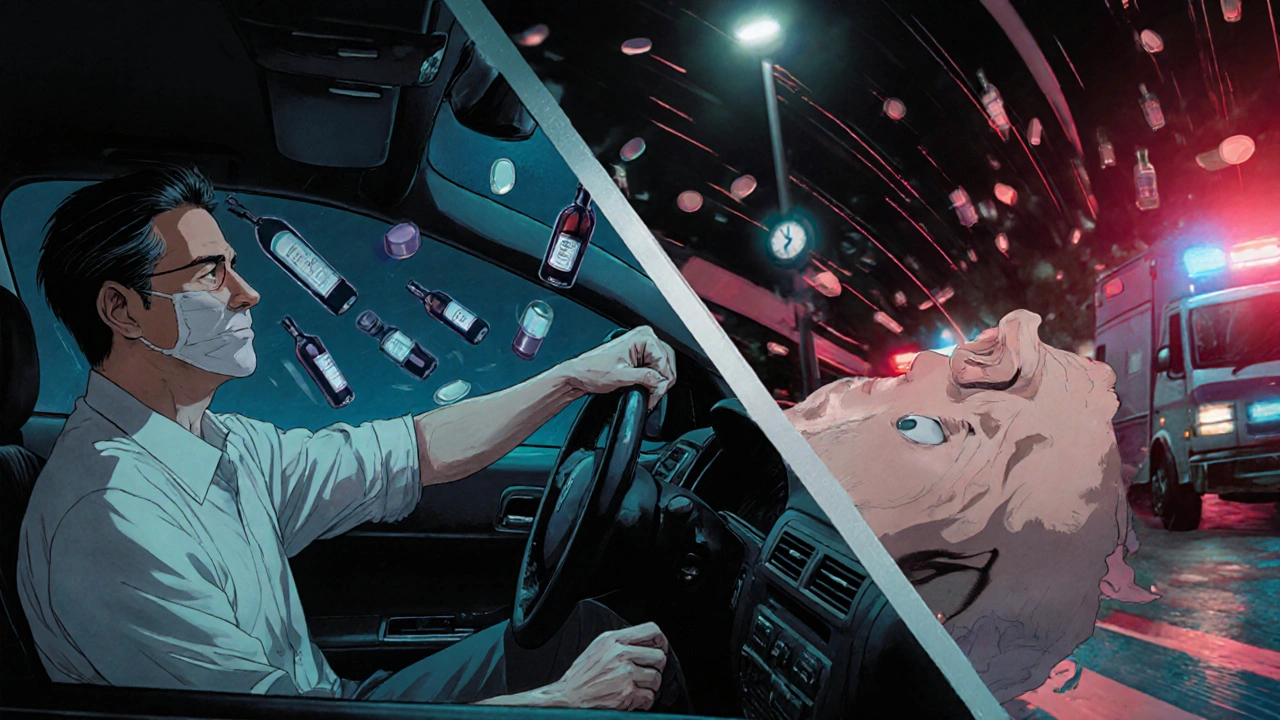
Who’s Most at Risk?
It’s not just older adults. The biggest group showing up in ERs with alcohol-sedative interactions is adults aged 35 to 54. That’s people in their prime-working, parenting, driving. But older adults face the worst outcomes. Why? Because as you age, your liver slows down. It takes longer to break down both alcohol and sleep meds. That means the drugs hang around longer, and the sedation lasts longer. A 70-year-old who drinks one glass of wine with Ambien might feel like they’ve had three.And here’s the scary part: 83% of fatal Ambien-alcohol deaths happened at blood alcohol levels below the legal driving limit. The median BAC in those cases? Just 0.051%. That’s less than one drink. You don’t need to be drunk to die from this mix.
What the Experts Say
The medical community is united on this. The FDA now requires a Black Box Warning on all Z-drugs: “Concomitant use with alcohol is contraindicated.” That’s the strongest warning they give. It means doctors must tell you this is not just risky-it’s forbidden.Dr. Robert Swift from Brown University calls this a synergistic effect-not just additive. “It’s not 1 + 1 = 2,” he says. “It’s 1 + 1 = 10.” The same enzymes in your liver (CYP3A4) process both alcohol and these drugs. When they compete, the drugs build up faster. Your brain gets flooded with sedation.
The American Academy of Sleep Medicine says advising patients to avoid alcohol with sleep meds isn’t enough. They say it’s a matter of medical ethics. “Not warning a patient is negligence,” says Dr. Lorenzo Cohen from MD Anderson.
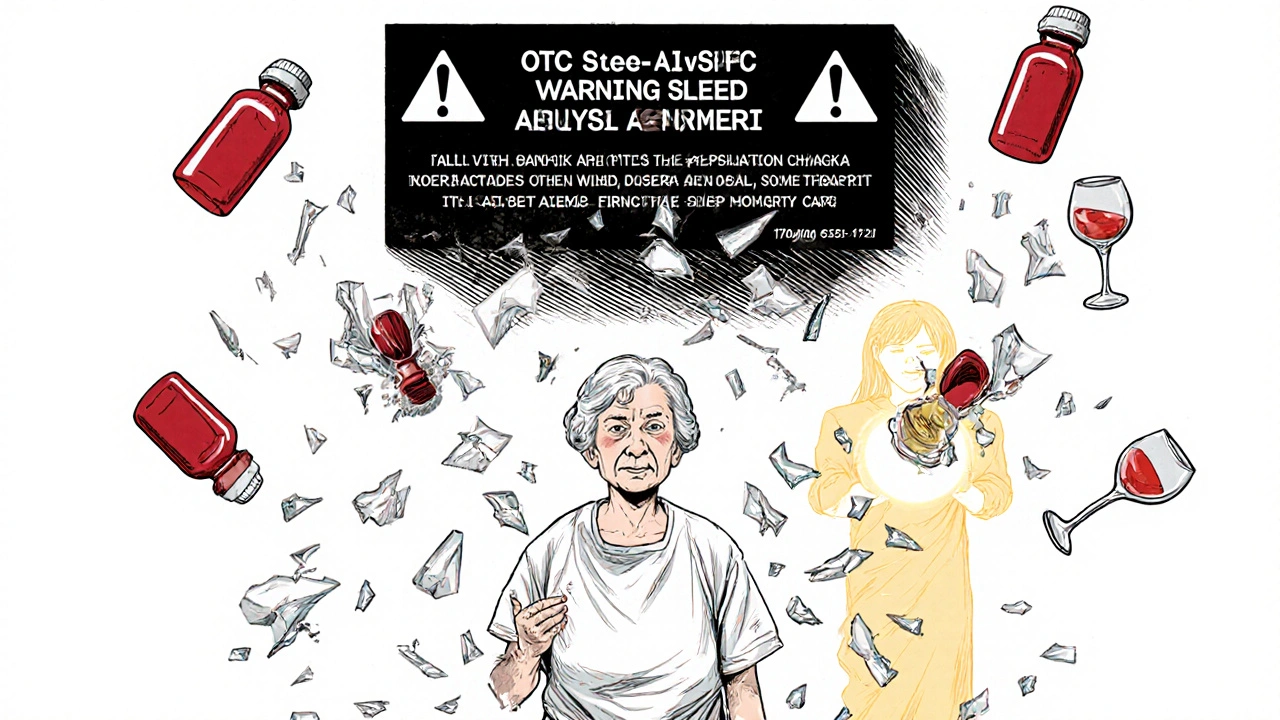
What You Should Do Instead
If you’re taking sleep medication, the only safe choice is to avoid alcohol completely. But if you’re struggling with sleep and drinking, here’s what actually works:- Wait at least 6 hours after drinking before taking Z-drugs. For benzodiazepines, wait 12 hours. This isn’t just a suggestion-it’s based on how long your body takes to clear alcohol.
- Don’t use OTC sleep aids if you’re over 65. The American Geriatrics Society says they’re too risky, especially with any alcohol use.
- Ask about alternatives. Newer drugs like Dayvigo (lemborexant) don’t work on GABA. They target orexin receptors, which regulate wakefulness. Studies show they have only a 15% increase in half-life with alcohol, compared to 150-200% for Ambien.
- Try non-drug options. Cognitive Behavioral Therapy for Insomnia (CBT-I) is proven to work better than pills long-term. It’s covered by most insurance now. No pills. No alcohol. Just better sleep.
Why This Problem Keeps Growing
Prescriptions for Z-drugs jumped 12% between 2018 and 2022. Over 58 million were filled in the U.S. alone last year. But only 32% of patients remember being warned about alcohol risks during their doctor’s visit. That’s a huge gap. Even though pharmacists are now required to hand out warning sheets (and 87% are doing it), many people still don’t read them.The FDA has started forcing drugmakers to put the warning in bold 14-point font on medication guides. Still, a Johns Hopkins study found 63% of patients ignored it. Why? Because they think it’s just a formality. Or they believe “just one drink won’t hurt.”
It’s not just about addiction. It’s about accidental death. Alcohol-sedative combinations now account for 18% of all prescription drug overdose deaths-up from 9% in 2015. That’s more than double.
What to Do If You’ve Already Mixed Them
If you’ve taken alcohol with a sleep med and feel dangerously drowsy, confused, or can’t stay awake:- Don’t try to “sleep it off.”
- Don’t drive. Don’t walk alone.
- Call 911 or have someone take you to the ER.
- Bring the medication bottle with you.
Respiratory depression from this mix can happen fast-and silently. You might not even realize you’re in danger until it’s too late.
Can I have one glass of wine with Ambien if I wait a few hours?
No. Even one drink can dangerously amplify Ambien’s effects. The FDA and medical experts say there is no safe amount. Alcohol extends the drug’s half-life, increases sedation, and raises the risk of sleep-driving, respiratory failure, and death-even at low blood alcohol levels. Waiting a few hours doesn’t eliminate the risk because both substances linger in your system longer than you think.
Is melatonin safe with alcohol?
Melatonin doesn’t cause life-threatening interactions like Ambien or Lunesta. But it still makes you more drowsy the next day-by 35%, according to a University of Toronto study. If you’re using melatonin to sleep, avoid alcohol to prevent next-day grogginess, impaired coordination, or accidents. It’s not deadly, but it’s not risk-free.
Why are older adults at higher risk?
As we age, our liver processes alcohol and medications 40-60% slower. This means both substances stay in the body longer, leading to prolonged sedation. Older adults also have weaker balance and slower reflexes, making falls more likely. Mixing OTC sleep aids like ZzzQuil with alcohol increases fall risk by 300% in people over 65. That’s why the American Geriatrics Society says they should avoid all alcohol while taking any sleep medication.
What are the signs of an alcohol-sedative overdose?
Signs include extreme drowsiness, confusion, slow or shallow breathing (less than 10 breaths per minute), bluish lips or fingernails, unresponsiveness, or inability to wake up. If someone shows these signs after mixing alcohol and sleep meds, call 911 immediately. This is a medical emergency-do not wait.
Are there sleep aids that don’t interact with alcohol?
Yes. Newer medications like Dayvigo (lemborexant) work differently-they block orexin, a brain chemical that keeps you awake. Unlike traditional sleep pills, they don’t affect GABA, so alcohol doesn’t amplify their effects as severely. In studies, alcohol increased Dayvigo’s half-life by only 15%, compared to 150-200% for Ambien. But even these aren’t completely risk-free. Always check with your doctor before mixing anything with alcohol.
What should I do if my doctor didn’t warn me about alcohol?
Ask your doctor right away. If you’re already taking a sleep medication, stop drinking alcohol immediately. You can also speak with your pharmacist-they’re required to give you a warning sheet with every prescription. If you’re unsure whether your medication is risky, look up the name on the FDA’s website or call the National Poison Control Center at 1-800-222-1222. Better safe than sorry.
If you’re struggling with sleep and drinking, you’re not alone. But the solution isn’t more pills or one more drink. It’s finding a safer way to rest. Talk to your doctor about CBT-I. It’s evidence-based, effective, and doesn’t come with a black box warning.

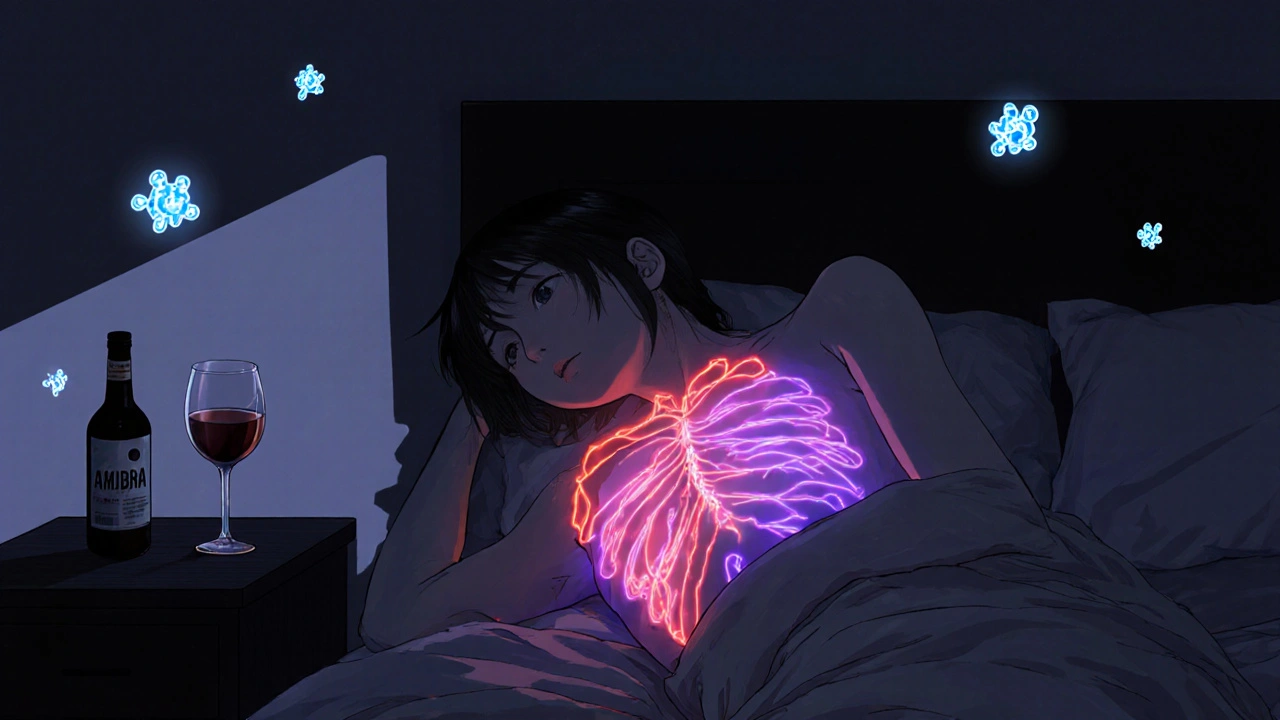


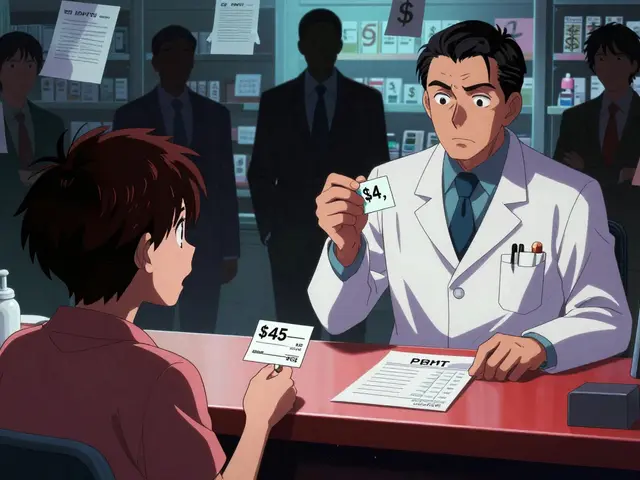

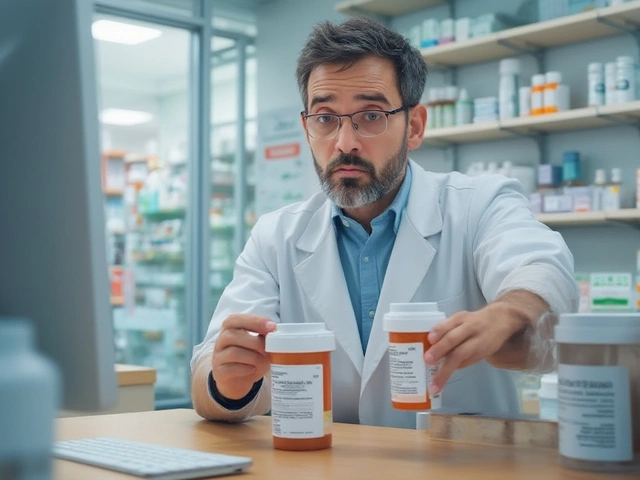
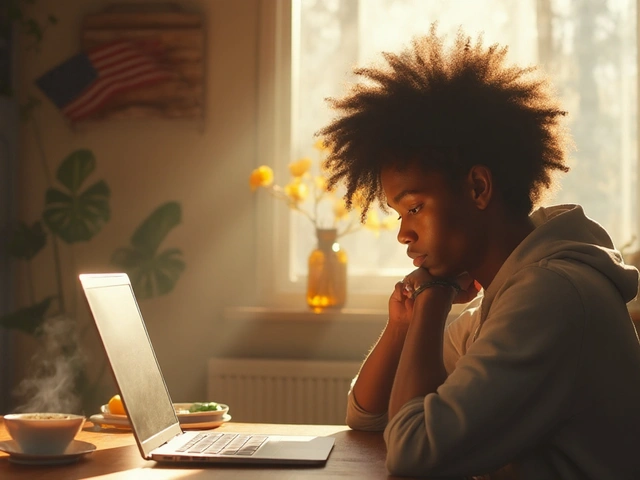
Joseph Peel November 17, 2025
There's no such thing as a safe amount of alcohol with sedatives. The FDA's black box warning exists for a reason. Even one drink can push your respiratory drive below critical thresholds. This isn't speculation-it's pharmacokinetics. Your liver enzymes get overwhelmed, half-lives stretch, and you're essentially sedating yourself into a coma without realizing it.
satya pradeep November 18, 2025
bro i used to do this all the time with zzzquil and a beer. thought it was chill. then woke up face down in the kitchen with my dog licking my ear. no memory of how i got there. never again. the body doesn't care if you 'only had one.'
Kelsey Robertson November 19, 2025
Oh please. This is just Big Pharma fearmongering disguised as public health. People have been drinking and sleeping for centuries. Where are the historical records of mass deaths? You're ignoring cultural context, evolutionary biology, and the fact that humans evolved to metabolize fermented fruit. Now we're told even a sip is a death sentence? Absurd. The real danger is losing autonomy to overbearing medical authorities who treat adults like children.
Joseph Townsend November 21, 2025
YOOOOO I just read this and my soul left my body for 3 seconds. I’ve been mixing Ambien with whiskey since college. Like, every damn Friday. Thought I was just a ‘light sleeper who needed a little liquid courage.’ Now I’m imagining myself sleep-driving into a tree with my cat in the passenger seat. My therapist is gonna have a field day. I’m done. No more wine with my pills. I’m switching to melatonin… and maybe therapy. Or a hammock. Or both.
Elia DOnald Maluleke November 22, 2025
In the grand tapestry of human frailty, we are but dust caught in the whirlwind of biochemical misjudgment. The body, a temple of electrochemical symphonies, is not meant to be silenced by the collusion of ethanol and pharmacopeia. We reach for sleep as a sanctuary, yet we poison its threshold with the very thing we believe soothes us. The tragedy is not in the overdose-it is in the quiet, daily surrender to illusion. That one glass? It is not a glass. It is a key turning in the lock of your own breath.
Sridhar Suvarna November 23, 2025
As a physician in Mumbai, I see this daily. Older patients take their pills with chai or beer thinking it helps them sleep better. No. It kills slower. We lost a 68-year-old last month-mixed ZzzQuil with two pegs of rum. No one warned him. The family thought it was just ‘old age.’ Education is the real medicine here. Not more pills. More awareness.
Prem Hungry November 24, 2025
you guys need to hear this: cbt-i works. i was addicted to ambien for 4 years. drank every night. nearly died. started cbt-i 18 months ago. no pills. no wine. just sleep restriction, stimulus control, and cognitive reframing. i sleep deeper than ever. my doctor said it’s the gold standard. it’s not sexy but it’s real. if you’re reading this and still mixing-you still have time to change.
Leslie Douglas-Churchwell November 26, 2025
THIS IS A GOVERNMENT-CONTROLLED SLEEP INDUSTRY PLOY. Melatonin is banned in 47 countries. The FDA only allows it as a ‘dietary supplement’ because they can’t patent it. Meanwhile, they push Z-drugs that are literally designed to be lethal with alcohol. The pharmaceutical-industrial complex profits from your fear and your dependency. They don’t want you to sleep naturally-they want you to pay for the illusion of sleep. Wake up. The truth is buried under 14-point font warnings no one reads… because they don’t want you to know.
Bill Machi November 28, 2025
Look. I’m an American. I work hard. I deserve to unwind. If I want one glass of wine with my sleep aid after a 14-hour shift, that’s my right. This country is built on personal responsibility. If you can’t handle one drink with your meds, maybe you shouldn’t be taking them. Stop coddling people. Stop making everything a crisis. This is just another example of overregulation masquerading as safety. Let adults make their own stupid choices.